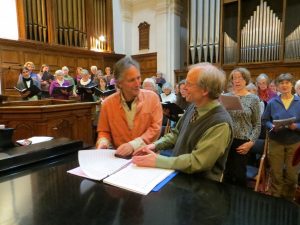 Nukhet Kardam, Professor at the Middlebury Institute of International Studies, recently passed her 25-year mark of employment. Nukhet took a few minutes to share her thoughts of “Life at the Institute” over the past two and a half decades.
Nukhet Kardam, Professor at the Middlebury Institute of International Studies, recently passed her 25-year mark of employment. Nukhet took a few minutes to share her thoughts of “Life at the Institute” over the past two and a half decades.
1. What did you do prior to coming to work at the Middlebury Institute and where were you located?
I was working as a Visiting Assistant Professor at Pomona College in the Department of Politics in Claremont, California.
2. What job titles have you held while working at the Middlebury Institute?
I think I came as Associate Professor, and then became Full Professor. I was the Program Chair for the MPA Program for several years.
3. Take us back to your first year as an employee at MIIS. What were the most significant things happening in your life outside of work then?
It was 1993, my son was 6 years old and started elementary school in Pacific Grove. We moved as a family to Pacific Grove and rented a house and hoped that my husband would find a job in this area, but it never happened. The first year I was at MIIS, he was on sabbatical from Scripps College in Claremont and he continued working there as a faculty member until he retired in 2008.
4. What are the most significant things happening in your life outside of work now (that you’d like to share)?
I am putting on “Aging Creatively” workshops for people in my generation. I absolutely love it and would like to expand these workshops, perhaps offering them to faculty across Middlebury who are close to retirement or already retired.
5. Have your interests/hobbies/athletic endeavors changed over the past 25 years? Have any of these been influenced by your work at MIIS or due to your association with others who work here?
I have realized that I don’t just want to be an intellectual and focusing on my mind, but become a ‘whole person’. So, I have become a Qi Gong and Zumba instructor. I am convinced that to live a fulfilled life, one has to combine all faculties and functions (imagination, thought, feelings, sensations) and trust one’s heart. I am on a Sufi spiritual path and I would like to combine my creativity, philosophy, and spirituality to offer to others and learn from others.
6. What is your fondest memory or experience that you’ve had while working at MIIS?
I don’t have a fondest memory. What I enjoy most is hearing form my former students and having a continuing relationship with them.
7. Many people change jobs/careers multiple times in their working life. Something must have kept you here for 25 years. Is it anything that you can put into words?
Yes, the ability of the school to allow me to change and grow. As I changed, the school accommodated me and allowed my creativity and different ideas to take shape and blossom. As the school changed, I stuck with it. What school would have given me the chance to write a book about my grandfather, go to Bread Loaf Writers’ Conference, and ultimately publish a book on Identity (from Ottoman to Turk and Beyond: Watercolor Identities)? This research was very close to my heart and also led to a successful seminar I still teach called Powerle Identity and Multiculturalism.
8. What are your plans for the next 25 years?
Offer “Aging Creatively” workshops around the U.S and in Turkey; teach Zumba Gold and Qi Gong classes, continue playing the piano and learn jazz piano and composition.
9. Do you have a favorite place on campus?
My office is perfect – large, great view, and all.
10. Is there any person on campus (or retiree, former employer) that mentored you, or you feel helped you grow into your job, grow to enjoy your work and your time at the Institute?
Yes, I could mention Ed Laurance who mentored me when I first came. We taught a couple of courses together which helped me a lot. Amy Sands, as Dean and then later Provost, always supported me and provided space for me to change. Amy McGill has been and is a great supporter.
11. If you could give one piece of advice to a new employee at MIIS, what would it be?
Give yourself time to grow into the job, make sure to get to know people from different programs, including staff, faculty, and students. Become part of the community and ENJOY it.
12. Is there anything else that you would like to share about your time at MIIS?
I have loved it!!
 The annual performance evaluation process for staff members takes place between January 1 and March 31 of each year. The APS form for 2019 remains the same as in previous years.
The annual performance evaluation process for staff members takes place between January 1 and March 31 of each year. The APS form for 2019 remains the same as in previous years.






